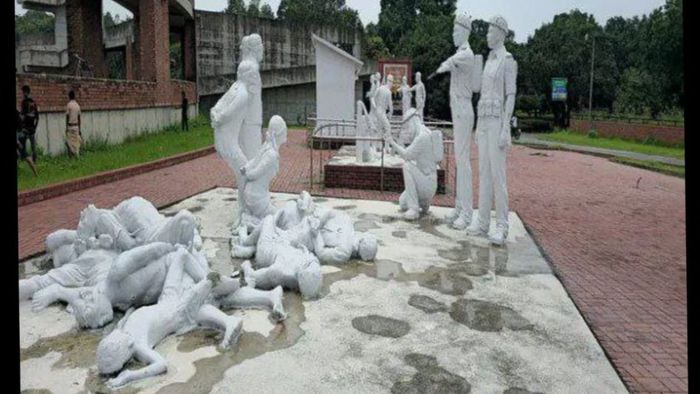1971 Shaheed Memorial Statue vandalised in Bangladesh protests, Congress reacts
The iconic statue at the 1971 Shaheed Memorial Complex in Bangladesh has been vandalised amid protests in the nation.

- Aug 12, 2024,
- Updated Aug 12, 2024, 1:10 PM IST
The iconic statue at the 1971 Shaheed Memorial Complex in Bangladesh has been vandalised amid protests in the nation.
Taking to his X handle, Congress MP Shashi Tharoor reacted sharply to the incident, calling out 'anti-India vandals'.
It is to be mentioned here that the statue commemorated the moment Pakistan surrendered in 1971, ending the Bangladesh Liberation War and the Indo-Pakistan War.
Tharoor shared a picture of the broken statue on X and expressed his sadness over the developments. He condemned the attacks on the Indian cultural centre, temples, and Hindu homes while noting reports of Muslim civilians protecting minority homes and places of worship.
Tharoor wrote that the attacks on minorities in Bangladesh show the agenda of some agitators. He urged Bangladesh's interim government head, Nobel Peace Prize winner Muhammad Yunus, to take urgent steps to restore law and order in the country for the benefit of all Bangladeshis.
Also Read: Bangladesh interim leader to meet Hindu youth amid ongoing unrest
Tharoor stated that India stands with the people of Bangladesh, but such anarchic excess cannot be condoned. The statue, called the 'Instrument of Surrender', depicted the signing of a document on December 16, 1971, by the Pakistan Army to the Indian forces and Bangladesh's Mukti Bahini.
Major-General Amir Abdullah Khan Niazi, representing Pakistan, surrendered with 93,000 troops before Lieutenant General Jagjit Singh Aurora, General Officer Commanding-in-Chief of India's Eastern Command.
AK Khandker, then Deputy Chief of Staff of the Bangladesh Forces, represented the Provisional Government of Bangladesh at the ceremony. It was the world's largest military surrender since World War II.
The student protests in Bangladesh began as demonstrations against quotas in government jobs but turned anti-government, leading to over 400 deaths and the ouster of Prime Minister Sheikh Hasina.
On August 5, she resigned and escaped to India. Amid the unrest, minorities, especially Hindus, have faced attacks, with mobs vandalising and looting their houses and lynching them.
These attacks have caused many Bangladeshis to amass at the India-Bangladesh border, mostly in Bengal. Muhammad Yunus has termed the attacks on minorities as heinous and urged citizens to protect all Hindu, Buddhist, and Christian families. He cautioned students not to let their efforts be sabotaged by those seeking to undermine their progress.